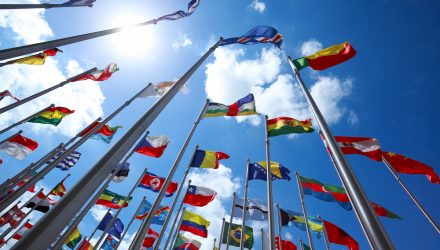International stocks and the related exchange traded funds have accumulated bum reputations after lengthy spells of underperforming domestic equivalents.
As such, many investors are quick to dismiss ex-US opportunities, amplifying long-running home country biases. That strategy has worked in recent years, but there are no guarantees it will be rewarding forever. It likely won’t be and with that in mind, ETFs such as the WisdomTree International Quality Dividend Growth Fund (IQDG).
The $837 million IQDG turned seven years old in April and, as its name implies, it’s a dividend-focused strategy. For an array of investors, IQDG’s dividend positioning could be appealing because many ex-US dividend payers deliver larger payouts and yields than U.S. rivals in the same sectors and because payouts smooth out volatility over the long-term, regardless of geography.
IQDG Merits
The WisdomTree ETF holds nearly 250 stocks from 20 countries, confirming some level of diversification. Additionally, IQDG is a passively managed fund — a status that might bring benefits for end users.
“For most investors, broadly diversified index funds are the best way to invest in international stocks. Few active managers have been able to consistently outperform the overall market over time,” noted Morningstar analyst Amy Arnott. “Index funds, on the other hand, harness the market’s collective wisdom about the relative value of each stock included in a given benchmark. They’re also cheaper: Investors in actively managed international-stock funds pony up annual expenses of about 1%, on average, but the typical index fund costs less than half of that.”
There’s something to consider with IQDG: The ability of dividends to bolster long-term performance. IQDG excludes U.S. and Canadian stocks, making for a relevant comparison with the widely followed MSCI EAFE Index. Over the past five years, the WisdomTree ETF beat that benchmark by more than 1,300 basis points.
The timeline mentioned above is relevant because ex-US developed market equities, particularly large-caps, often aren’t conducive to short-term trading, unless investors are seeking small gains. It can take time for this asset class to properly “marinate. Embracing a longer holding period is made easier with dividends — IQDG’s bread and butter.
“Morningstar’s Role in Portfolio Framework recommends holding international-stock funds for at least 10 years,” concluded Arnott. “We came up with this guideline partly by looking at the historical frequency of losses over various rolling time periods ranging from one year to 10 years. We also considered the maximum time to recovery, or how long it usually takes to recover after a drawdown.”
For more news, information, and analysis, visit the Modern Alpha Channel.








